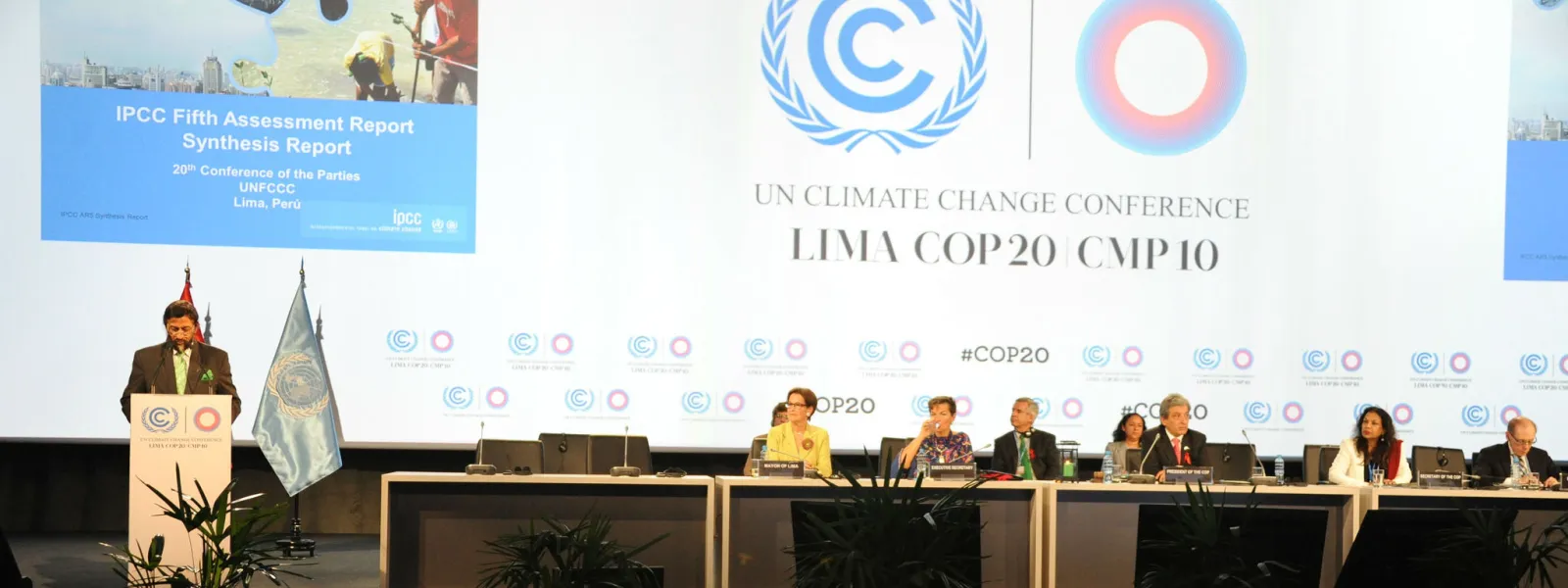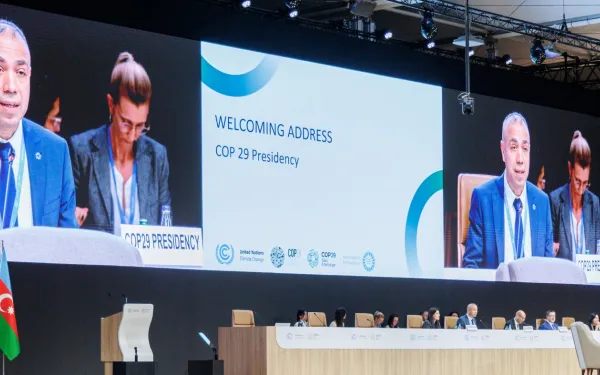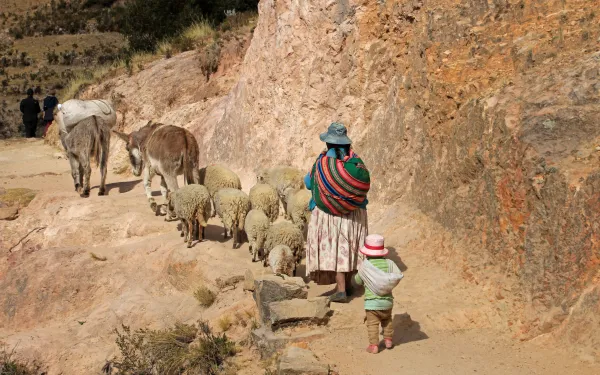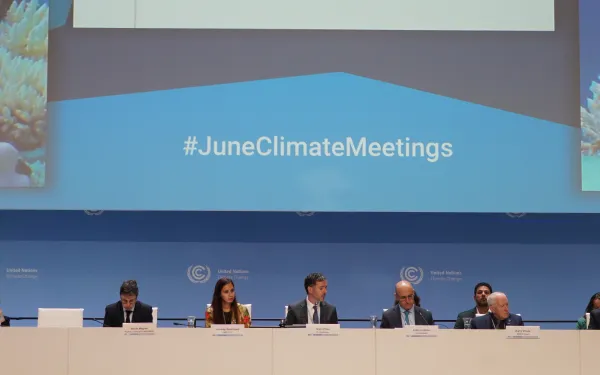
Project
Photo: UNFCCCMonitoring the UN Climate Negotiations
As changes in climate become more extreme, their affects are being hardest felt throughout developing countries. Since 1994, the United Nations Framework Convention on Climate Change has laid out actions to limit the increase of global average temperatures and confront the impacts of climate change.
The States that are Parties to the Convention meet every year in the so-called Conference of the Parties (COP) to review their commitments, the progress made in fulfilling them, and pending challenges in the global fight against the climate crisis.
At COP21 in 2015, they adopted the Paris Agreement, which seeks to strengthen the global response to the climate emergency, establishing a common framework for all countries to work on the basis of their capacities and through the presentation of Nationally Determined Contributions (NDC) that will:
- Limit the increase in global temperatures to 2°C compared to pre-industrial levels and continue efforts to limit it to 1.5°C;
- Increase the capacity of countries to adapt to the impacts of climate change; and
- Ensure that financing responds to the goal of reducing greenhouse gas emissions.
Our focus areas
THE CLIMATE CRISIS AND HUMAN RIGHTS
The climate crisis, due to its transversal character, has repercussions in various fields, geographies, contexts and people. In this regard, the Preamble to the Paris Agreement states that it is the obligation of States to "respect, promote and fulfill their respective obligations on human rights, the right to health, the rights of indigenous peoples, local communities, migrants, children, persons with disabilities and people in vulnerable situations and the right to development, as well as gender equality, the empowerment of women and intergenerational equity."
AIDA at the COP
COP25: Chile-Madrid 2019
At COP25 in Madrid, Spain, we advocated for the inclusion of the human rights perspective in various agenda items. We promoted the incorporation of broad socio-environmental safeguards in the regulation of Article 6 of the Paris Agreement, which refers to carbon markets. We closely followed the adoption of the Gender Action Plan, as well as the Santiago Network, created "to catalyze technical assistance […] in developing countries that are particularly vulnerable to the adverse affects of climate change." We also encouraged the inclusion of ambitious and measurable targets for the reduction of short-lived climate pollutants in the climate commitments of States.
Related projects
Latest News

COP29: Climate target disappoints and invites us to look elsewhere for hope
The twenty-ninth United Nations Climate Change Conference (COP29), held in Baku, Azerbaijan, was dubbed "the COP of finance" because the most anticipated decision was the establishment of the New Collective and Quantifiable Global Climate Finance Goal (NCQG), the amount that developed countries would pledge to finance climate action in developing countries. This issue grabbed all the attention, overshadowing everything else.In addition, the recent re-election of Donald Trump as President of the United States, accompanied by his threat to abandon the Paris Agreement and reverse the country's climate action, set the tone for the event.The negotiations, which took place from November 11 to 22, were intense and ended almost two full days late, with the approval of a text that caused great disappointment.However, the invitation is not to be blinded by disappointment. As much as we want, demand and hope, the international climate negotiations are not delivering what we so desperately need. Let us look for hope in what is happening and working, such as local, community-led projects and the work of civil society that is not giving up.Here is a review of COP29 based on what was agreed on climate finance and other relevant issues. A new climate finance targetThe mandate was clear: the new target should exceed the previous one of $100 billion per year and respond to the needs and priorities of developing countries. But while developing countries demanded $1.3 trillion per year, the offer was a mere $300 billion (less than a third and just 12% of the global military budget in 2023) by 2035. "Is this a joke?" exclaimed the head of the Bolivian delegation at a press conference.Developing countries also demanded that financing be adequate, i.e. based mainly on public resources, in the form of grants and highly concessional instruments that would not add to the heavy debts they already carry. They also called for the explicit inclusion of loss and damage as one of the objectives of financing (along with mitigation and adaptation), as well as a specific target for adaptation.None of this was achieved. The target was left open to private financing, further diluting the responsibility of developed countries. There was no specific target for adaptation, nor was there any mention of loss and damage. In case there was any doubt, all references to human rights were removed from the final text.The only saving grace was a call to mobilize $1.3 trillion in climate finance annually from a broad base of sources through the so-called Baku-Belem Roadmap, with a view to achieving this goal by 2035. However, this is a "call" and not a binding commitment, the concrete results of which will depend on political will in the coming years. Global stocktaking and gender issuesNo significant progress was made on the results of last year's Global Stocktaking on the implementation of the Paris Agreement, particularly on the transition away from fossil fuels. The issue was deferred to COP30, which will be held next year in the Brazilian city of Belém do Pará.While there has also been insufficient progress on gender issues, some progress should be recognized, such as the extension of the Lima Work Program to 10 years, which lays the groundwork for the development of a Gender Action Plan and provides an opportunity to further deepen the integration of gender into climate action, particularly as countries develop updates to their Nationally Determined Contributions (NDCs).In addition, the text of the NCQG recognizes women as beneficiaries of funds but fails to ensure that the specific circumstances and intersectional discrimination that many women face are addressed. Carbon marketsWhat did see advances during the negotiations were carbon markets, with the approval of the rules for a global market. Carbon markets are trading systems where carbon credits are bought and sold. Each credit represents one ton of CO₂, or its equivalent in other greenhouse gases, removed from the atmosphere. The credits are generated by projects that reduce emissions (such as forest conservation, renewable energy, or energy efficiency). The buyers are polluting companies that want to offset their emissions in order to remain in compliance.The issue has been under discussion for more than a decade due to the difficulty of ensuring the credibility of the system to reduce emissions. Although it is the last outstanding issue of the Paris Agreement, signed more than 10 years ago, civil society is not celebrating. These markets allow companies to continue polluting if they pay for carbon reductions elsewhere in the world. Methane emission reductionsA promising development was the signing of the Declaration on Methane Reduction from Organic Waste by more than 30 countries. The signatories, representing nearly half of global emissions, committed to setting sector-specific methane reduction targets in their future NDCs, underscoring the importance of organic waste management in the fight against climate change. Closing thoughtsIn the end, the results are not surprising. Conventions on climate change are often not much to celebrate, but we must not forget that they are a unique space where all countries sit down to seek consensus to advance a common goal. Its very existence reflects an intention to acknowledge historical responsibilities in favor of justice and a world where we can live together in harmony. It is a platform from which to push, even if it brings more frustration than results.On the other hand, it is very encouraging and motivating to see civil society in action. Hundreds of representatives from different organizations and movements are doing their best to achieve results that reflect the fulfillment of international commitments of developed countries towards their developing counterparts, the climate and the natural balance of our planet.Finally, the side events that take place parallel to the negotiations are a source of inspiration. On the sidelines, without much fanfare, there are people from communities and indigenous peoples who are implementing climate solutions in their territories, with concrete, successful results. These people, like seeds silently germinating, are a powerful source of hope.
Read more
Let's talk about NDCs, countries' commitments to the climate crisis
Nationally Determined Contributions (NDCs) are the plans developed by each country to address the climate crisis under the Paris Agreement. In them, countries commit to meeting targets for reducing their greenhouse gas (GHG) emissions and making progress in adapting to the climate crisis, including - ideally - how they will finance these actions. The Paris Agreement, from which NDCs are derived, is a legally binding international agreement to combat climate change that entered into force in 2016 after being signed by 195 countries. As such, NDCs are the pathway to achieving the Agreement's goals, which are to: Ensure that the global average temperature increase is well below 2°C, preferably 1.5°C, above pre-industrial levels. Strengthen the capacity to adapt to the impacts of climate change. Align financing with the needs of countries to achieve these goals. Each country is free to decide and commit in its NDCs how it will adjust to and alleviate the impacts of the crisis, based on its unique abilities and circumstances. In this sense, NDCs reinforce the agreed-upon global goals to address the climate crisis and contain specific commitments by countries to achieve them. They also provide short- and medium-term plans, with political backing, in key areas not only to stabilize the climate, but also to promote sustainable development and address other global crises such as pollution and biodiversity loss. Countries that have signed the Paris Agreement must submit their NDCs to the Secretariat of the United Nations Framework Convention on Climate Change (UNFCCC) and update them every five years with increasingly ambitious targets based on their own capabilities. The Conferences of the Parties (COPs), the decision-making body of the Convention, will provide guidance to countries on how to meet these commitments. The first NDCs were presented in 2015, when the Paris Agreement was adopted, and their first update occurred in 2020. Next year, countries must update them again with targets for 2030 and 2035. Given their relevance for global climate action and the proximity of the second update, we will dig deeper into relevant aspects of the NDCs. The content of the NDCs In their NDCs, countries present a projected analysis of climate risks and impacts, as well as specific commitments to reduce greenhouse gas emissions and adapt to the impacts. This results in quantitative or qualitative targets, deadlines and actions in priority sectors such as agriculture, water, biodiversity, forests, energy, risk management, industry, infrastructure, fisheries, health, transport, tourism and coastal zones, among others. Most countries include indicative budgets for achieving their targets, and many developing countries indicate the support they will need—financial, technology transfer, and/or capacity-building—to implement some or all their actions. In an NDC, targets that can be achieved without external support are called "unconditional" and those that depend on such support are called "conditional." Examples of NDC commitments include: Reduce 22 percent of its GHG emissions with its own resources by 2030 (unconditional mitigation target). Increase GHG reduction to 36 percent, but subject to a global agreement that includes technical cooperation and technology transfer, as well as access to low-cost financial resources (conditional mitigation target). Increase, by 2030, the adaptive capacity of the population to climate change and reduce the high vulnerability of 160 municipalities (unconditional adaptation goal). Progress on NDCs According to the World Resource Institute, current NDC emission reduction commitments submitted by countries fall far short of the ambition needed to meet the Paris Agreement's goals, as they would result in a temperature increase of between 2.5 and 2.9°C even if fully implemented. On a more optimistic note, data from the United Nations Development Program's Climate Promise initiative, which is supporting 85 percent of countries in the preparation of their NDCs, shows that the most vulnerable countries are making tangible progress in terms of ambition. For example, African countries are more committed than the global average to their climate resilience goals, increasing transparency efforts, and incorporating just transition, while the NDCs of Latin American and Caribbean countries show high levels of stakeholder engagement and accountability compared to the global average. Although most Latin American countries have plans to reduce GHG emissions, adapt to climate change and promote renewable energy in their NDCs, they remain dependent on oil, gas and coal, making their current climate commitments insufficient. Human rights and gender approach in NDCs While the global crisis is a threat to humanity, its impact is disproportionately felt by vulnerable populations who are less able to cope. This is the case for indigenous and Afro-descendant peoples, as well as peasant and rural populations. Furthermore, according to the UN Human Rights Council, "women are particularly vulnerable to the risks associated with climate change due to gender discrimination, inequalities and gender roles that constrain them. One of the main negative impacts of the climate crisis on women is that it exacerbates the burden of unpaid domestic and care work, thereby deepening existing structural inequalities. Considering the above, it is essential that States incorporate the human rights framework and the gender perspective in the formulation of their climate policies, as recognized by various international instruments and treaties. This implies that States - in the elaboration, implementation and monitoring of NDCs - comply with their obligations to promote, respect, protect and fulfil human rights without discrimination and with a gender and intersectional approach, thereby strengthening the capacity of people and communities to act effectively in the face of the climate crisis, particularly those who have been historically marginalized. NDCs must also ensure the rights of future generations and the long-term integrity of ecosystems. What's next Next year's round of NDCs should focus on delivering on the commitments made at the 28th United Nations Climate Change Conference (COP28) to phase out fossil fuels in energy systems, set specific methane emission reduction targets, triple renewable energy and double energy efficiency. Given that this new round will cover targets up to 2035 - the midpoint between 2020, when countries began implementing their NDCs, and 2050, the year agreed for achieving the global goal of zero net emissions - the commitments presented are critical to aligning near-term actions with long-term goals. In the face of accelerating climate impacts with increasingly severe consequences, there is an urgent need for NDCs with sufficient ambition to contribute to deep emission cuts, enhanced adaptation, adequate attention to loss and damage already caused, and a significant increase in climate finance. Learn more To learn more about the progress of each country's climate commitments, you can: Consult the UNFCCC database, which contains the list of countries that have submitted their NDCs and the date they did so. Consult the information generated by the Climate Action Tracker, which tracks governments' climate actions and compares them to the Paris Agreement targets. Learn about NDC LAC, a digital tool that provides information on progress in implementing and updating NDCs in Latin America and the Caribbean. sources - United Nations Framework Convention on Climate Change, "Nationally determined contributions (NDCs). The Paris Agreement and nationally determined contributions". - United Nations, "All about NDCs." -World Resources Institute, "Next Generation NDCs. Accelerating climate action under the Paris Agreement". - United Nations Development Programme, “What are NDCs and how do they drive climate action?”. - Verónica Méndez Villa and Daniela García Aguirre, "Human Rights and Gender Perspective in Nationally Determined Contributions (NDCs) in Latin America," Interamerican Association for Environmental Defense (AIDA). - Inter Press Service, "Latin America arrives at COP28 with insufficient ambitions for its goals".
Read more
Climate negotiations: Reflections after the Bonn meeting ahead of COP29
By Florencia Ortúzar and Javier Dávalos* The 60th session of the UN Subsidiary Bodies on Climate Change (SB60) was held in Bonn, Germany, from June 3-13, 2024. These sessions, held twice a year, consist of technical meetings at which government delegates advance the agenda for international climate negotiations. The Bonn session was part of the preparations for the twenty-ninth United Nations Climate Change Conference (COP29) to be held in Baku, Azerbaijan, in November, and was guided by the agreements reached at COP28, held last year in Dubai, United Arab Emirates. AIDA participated in SB60 to bring the voice of Latin America to the negotiations from a human rights and gender perspective. The following are reflections on the four main issues addressed at the meeting: just transition, global accounting, the new financing target, and the Loss and Damage Fund. Work Programme on Just Transition On June 2 and 3, the long-awaited first dialogue took place on the Just Transition Work Programme, which was created at COP27 to address the challenges of the transition to low-carbon economies and societies. The goal is to achieve an equitable and inclusive process that promotes the protection of workers and affected communities. Civil society observer organizations noted that the principles of a just transition require an assessment of the impact of climate action on all human rights - including labor, social, economic and environmental rights - in key areas. To this end, decision-making in the work programme must include social dialogue and multiple levels of consultation with groups and communities. AIDA advocated for the justice dimension to consider the differentiated impacts of the transition in different areas of the planet, particularly in the Global South, where the extraction of transition minerals (lithium, cobalt and copper, among others) threatens fragile ecosystems, species and vulnerable communities. The problems of fossil fuel extraction are being repeated. Safeguards, participatory approaches and international cooperation are therefore relevant. It is also important to support economic diversification approaches that protect us from a new dependence on the sale of raw materials and encourage the search for new sources of income. Follow-up to the Global Stocktake Dialogue The Global Stocktake is a collective assessment mechanism to review global progress on climate mitigation, adaptation and finance every five years. The exercise will allow us to know whether global efforts are sufficient to meet the goals of the Paris Agreement to limit the global temperature rise to below 2°C, and hopefully 1.5°C. The results of the stocktaking should have a direct impact on countries' climate commitments contained in their Nationally Determined Contributions (NDCs). The text of the first stocktaking, adopted in 2023, gave way to the process of updating the NDCs, which countries must submit in 2025 and which must reinforce the historic commitment made at COP28 to phase out fossil fuels, set specific targets to reduce methane emissions, triple renewable energy, and double energy efficiency. The updated NDCs must include clear adaptation measures based on the conservation of biodiversity and key ecosystems such as the Amazon, wetlands and oceans. AIDA will monitor and follow up to ensure that countries in the region make progressive climate commitments that are consistent with what was agreed in the Global Stocktake. The new collective quantified goal on climate finance In 2009, developed countries agreed to mobilize $100 billion per year by 2020 to support climate action in developing countries. Then, in 2015, when the Paris Agreement was signed, it was agreed to set a new collective quantified goal on climate finance (NCQG). This target should be adopted in November, during COP29, and the Bonn meeting should pave the way for it. In addition, the new target will be an indicator of developing countries' ability to meet their updated NDCs, as well as a sign of fairness that could strengthen the credibility of the climate negotiation system. However, reaching an agreement has not been easy due to the number of decisions needed to outline the new target in its entirety. The most difficult point to agree on is the amount that developed countries will have to commit to. So far, they have only agreed that it should exceed US$100 billion. The Latin American countries, for their part, have not been able to propose figures based on the needs of the region. The list of countries that will contribute to the target is also still under discussion. According to the developed countries, some countries at an advanced stage of development could begin to contribute. There is also debate over whether the new target should also be used to finance loss and damage compensation, an issue that was not considered when the previous target was discussed and for which there is now a special fund. Another challenge for developing countries is that the financing resulting from the new target should not increase public debt. There are other details that still require agreement. The COP co-chairs must now propose a document that reconciles divergent visions and serves to reach agreement at COP29. Countries can apply the lessons learned from the first target and secure a new target that is more effective in terms of quantity and implementation. Financing climate action is neither a handout nor a charity, but a duty and responsibility of developed countries. It is also in their interest: the effects of the climate crisis are global. Without a goal, there are no financial flows, and without financing, there is no way to address the crisis. Launching the loss and damage fund The Loss and Damage Fund was established in 2022 at COP27, and its operationalization was agreed a year later at COP28. While the creation of the fund is welcome, it is only a first step in making it the channel of support so desperately needed by countries already suffering the worst impacts of the climate crisis. There are many challenges ahead. The Bonn meeting confirmed that the World Bank will be the interim administrator of the fund for the first four years. For civil society and developing countries in general, loss and damage must be recognized as the third pillar of climate action, alongside mitigation and adaptation. However, some developed countries seem to be suggesting that with the creation of the fund, it would no longer be necessary to include the issue as part of the new collective quantified climate finance goal, which does not make sense. Moreover, the amount that developed countries have pledged to the fund so far is less than 0.2% of what is needed annually. There is still no strategy that proposes how much contributing countries should contribute according to their responsibilities and capacities. The fund must be decentralized and involve civil society, indigenous communities, youth, women and other vulnerable groups from the outset to ensure that the money reaches those who need it. It must also be efficient and sufficient, providing financial and quality assistance as quickly as possible. On the other hand, developing countries, including those in Latin America and the Caribbean, must make efforts to monitor and report losses and damage in their territories, which often poses economic, technical and even methodological challenges that require support, training and guidance. The results of international climate negotiations are slow and the process often frustrating. The attitude of many industrialized countries, which shirk their responsibilities while enjoying development at the expense of the global climate balance, is disappointing. However, in the face of such a scenario, lowering our guard is not an option. The organized civil society working around these negotiations is a cause for hope. It is a demonstration of solidarity and competence that achieves results and does not give up. By being there, representing our region, we are contributing to this movement with the wisdom and strength that comes from the Global South. *Florencia Ortúzar is a senior attorney with AIDA y Javier Dávalos is the Director of AIDA's Climate Program.
Read more